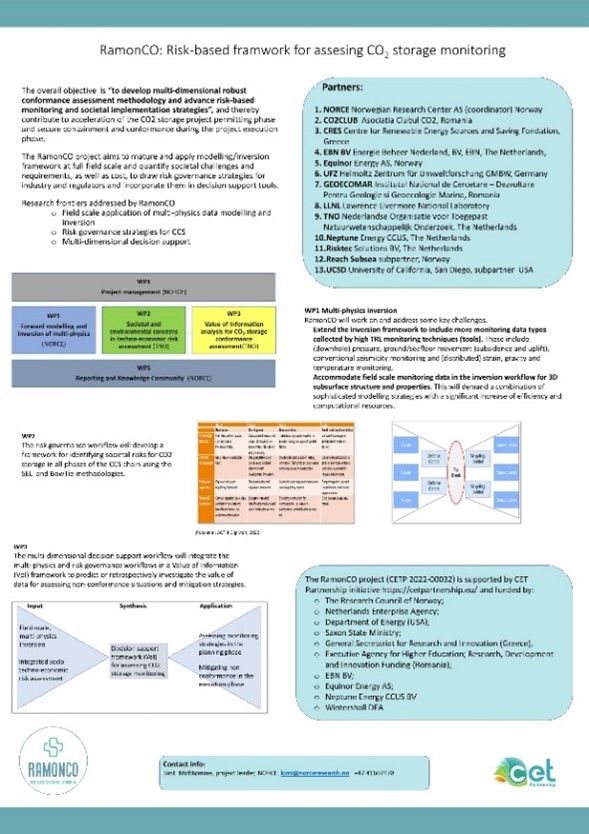Proiecte
RamonCO: Risk-based framework for assessing CO2 storage monitoring

| Responsabil: | Dr. Constantin Ștefan Sava, CSI |
| Coordonator: | NORCE NORWEGIAN RESEARCH CENTRE |
| Beneficiar: | GeoEcoMar |
| Finanțator: | UEFISCDI & European Comision |
| Schema de finanțare: | CETP ERANET COFUND |
| Durata: | 36 months |
RamonCO: Risk-based framework for assessing CO2 storage monitoring
Accelerating CCS to achieve significant CO₂ reductions by 2030 requires close integration of technical, economic, social, and environmental disciplines to support decision-making related to permitting, ensuring safe containment, and maintaining compliance during the execution phase of CCS projects. The RamonCO Project aims to further develop and fully apply the modeling/inversion framework developed in DigiMon and to assess societal challenges and requirements, as well as costs, in order to develop risk governance strategies for industry and regulators, incorporating them into decision-support tools.
The project will develop and demonstrate methodologies and tools for compliance assessment and risk-based monitoring on an industrial scale, including the analysis of operational data from sites equipped with relevant monitoring technologies. At the start of the project, we will initially test the inversion framework using synthetic data and then explore the possibility of obtaining suitable real-field data for testing the methodology with industry partners. Furthermore, we will model CO₂ storage sites that are in the planning phase, such as depleted gas fields in the Netherlands. We will also investigate how different perspectives on CO₂ storage across European countries influence risk assessment (for EU CO₂ storage hubs) and how these insights can be used to make informed decisions regarding the monitoring systems.
By focusing on CO₂ storage, RamonCO directly addresses TRI3’s primary objective of advancing solutions for Carbon Capture and Storage (CCS) technologies. However, the project’s results will also be applicable to other types of storage, such as hydrogen, renewable fuels, and underground thermal energy storage (UTES).
As it tackles issues related to authorizing new storage capacity and ensuring containment integrity and compliance during site operations, the project supports TRI3’s aim to fund initiatives that significantly accelerate technology deployment and demonstrate measurable reductions in CO₂ emissions by 2030, while also contributing to climate neutrality by 2050.
RamonCO addresses two of the six research and development areas targeted in the call:
- CO₂ storage sites, including key elements for characterizing and managing large-scale, permanent CO₂ storage, such as storage integrity, monitoring, capacity estimation, and modeling;
- CCUS technologies that are highly important and relevant to the industry.
Additionally, the project addresses three of the nine challenges listed in the call:
- Improving cost and energy efficiency along the value chain (scaling, gigaton storage, efficiency, digital tools, effective collaboration between stakeholders);
- Accelerating the scaling of CO₂ technologies with lower risks (design, demonstrations, legal framework development, measures to strengthen the innovation system, knowledge sharing from full-scale operations, integration into the energy system, etc.);
- Enhancing public acceptance of CCU/CCS.
